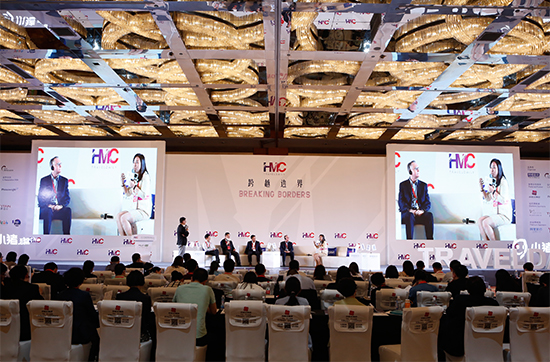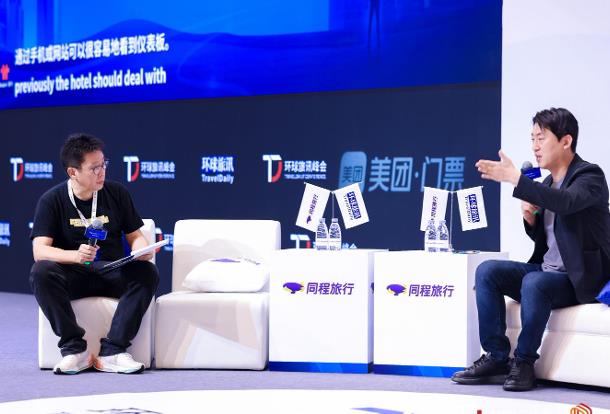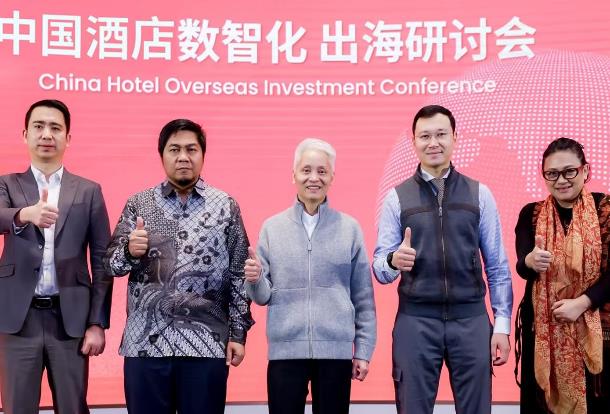ChinaTravelNews, Nicole Sy-Technology and innovation have broken borders in the hospitality industry, providing sophisticated technological solutions to hotels to better serve guests. An executive panel at the 2016 China Hotel and Marketing Conference spiritedly debate on what these are, and how these technologies will be implemented.
Moderated by Senior Vice President of Super 8 (China), Joe Xu, the group consists of solutions providers to hotels making inroads in hospitality’s tech scene. They are: Xinxin Liu, the CIO, of Huazhu Hotels Group; Kevin King, COO of Shiji; Alex Xu, Founder & CEO of Titan; Philip Liu, General Manager, China of Sabre Hospitality Solutions; and Heinz Xu, Digital Marketing & Innovation Vice President at HomeInns Hotels Group.
The hoteliers agreed their technology is focusing on enhancing the consumer experience, especially with majority of consumers now young, tech-savvy millennials. Liu of Huazhu says it’s about making things more convenient, no matter how minute the matter is. “We are working on holistic services for our consumers. For example Apple Pay, or Wechat Wallet,” she says, mentioning popular payment platforms. “From a transaction of 3 minutes to 30 seconds, we hope it is more efficient,” she adds.

Another small change the group implemented was USB-insert charging ports in Huazhu’s hotels. “It’s just one small innovation,” says Liu. “Technically speaking, it’s not that awesome but it was well received by our consumers. We have to think about whether we can really resolve the consumer’s pain points.”
Heinz Xu from HomeInns says their hotels are trying something a bit more different: robotics. “It’s a preliminary attempt at incorporating these technologies like Google’s Alpha Go. We want to combine these new tech which can be applied and enhance consumer experience,” he says.
“We are facing a new generation of consumers. We are a standard hotel group, but we hope can bring something new to our clients,” says Xu.
On the technology-provider side, the focus was not only on mining data, but understanding the meaning behind all the information collected from property management systems (PMS) and computer reservation systems (CRS). “One thing we don’t take too much into consideration is the science,” says Kevin King of Shiji.
That means forecasting, according to Philip Liu of Sabre Hospitality Solutions. “For hotels, the past is past, no occupancy means no profit. What’s important is forward thinking, to forecast two to three weeks time,” he says. “For example, on Monday you open the report and see all the channels and monitor traffic volume. Once you have this data, you can make a better decision. The science can be helpful if you can get valuable data.”
For Alex Xu of Titan, it was about connectivity. “The hotel will be connected with its client and the supply side. For example if the travelers go to Shanghai, it’s not just about the cheap ticket or cheap hotel. It’s for their trip to Shanghai Disney. They will have different needs. They want a ticket, and want to rent a car, and more,” he elaborates. “For our site, although we are providing solutions, we have to go beyond what this industry requires.”
However, the group diverged when it came down to how the technology was going to be developed. Xinxin Liu argued that some key technologies should be developed in-house specifically for the business. “For revenue management, we should have a sharing spirit in which we can put the best ideas in the industry and then use that,” she says. “But for interfaces like PMS and CRS, for those key assets are better off in your own hands. We can outsource some, but some we cannot.”
HomeInns’ Xu also sees room in the industry for hotels to develop some of their own tech. “At the end of the day, we should think which parts should be in our hands, which parts should be outsourced. We want our own internal optimization so we can change everything. But we can also rely on third parties to outsource from and make a difference.”
The technology players don’t think that’s the way to go. “That’s not a good idea,” Shiji’s King contends. “We need to look and learn from others in the world. Many tried to develop their own PMS but they failed since they’re not in the tech field. Hotels do a very good job taking care of guests, and tech companies do a very good job doing tech.”
Philip Xu nods in agreement. If IT costs go down, revenue goes up, he explains on outsourcing technology for operating systems.
Though it is not easy to keep up, as moderator Joe Xu and Titan’s Alex Xu notes the fast-moving nature the hospitality sector. “It’s hard to even compare the needs of two years ago with what's happening now,” Xu says. “How can we be fast and responsive to needs today? Hotels should do cross-disciplinary meetings so they don’t have to do anything you’re not good at.”
King understands the challenges of the fast-paced industry and the problems this poses for technology providers. “Let’s use China as example. Two years ago, demand was completely different with what it is today. But we cannot afford to constantly put new innovations in the industry,” he says.
To address that, focus needs to be on the method of communication, says King. “We need to be able to use commonly-used consumer devices to use to fulfill that need... Like mobile, everyone has a mobile phone. They have the ability to reach. I think the focus needs to be working the solutions where the consumer devices are.”
Heinz Xu of HomeInns has the same opinion on the development of mobile technology. “Without mobile, we cannot address the pain points. We cannot reduce queue time and shorten the queue,” Xu says, referring to the crucial moment in transactions where customers are lost. “Now, we can use Alipay and other technology. New tech is already being utilized in a good way. It’s about how we can combine our needs and its capabilities.”
Agreeing to disagree on some matters, all panelists underscored the importance of developing technology not just for the sake of putting something new out every few months, but to directly address industry and consumer needs.




